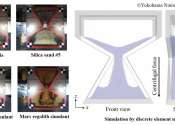Organic solar cells show promise for cheap energy production, researcher says
A newly published doctoral thesis at Karlstad University shows that organic solar cells are a promising technology, due to its flexibility and vast potential applications.
Nov 28, 2023
0
10









